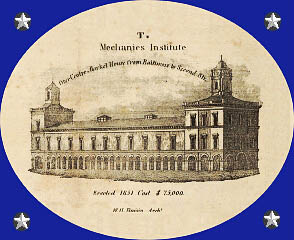The President's train pulled into Baltimore's Camden Station promptly at 6:00 on the evening of April 18, 1864. It was one of his few trips outside of Washington during the Civil War. Abraham Lincoln carried with him the knowledge that the crucial spring campaign of the Union armies under their new commander, Ulysses S Grant, would begin in just two weeks; a coordinated plan of attack in which George Meade's Army of the Potomac (accompanied by Grant) would set out to destroy Robert E Lee's Army of Northern Virginia and William Tecumseh Sherman's troops would march on Atlanta (to learn more, read The Overland Campaign Begins). Its success or failure would determine the outcome of the war and of Lincoln's presidency as he faced his own campaign, for reelection in what was expected to be a close race that year.
The event that drew the President to Baltimore was the Maryland State Fair for U.S. Soldier Relief, more popularly known as the Sanitary Fair. The idea of two members of the Ladies Union Relief Association, Ann Bowen and Fanny Turnbull, the Baltimore fair, like those in other Union cities was designed to raise funds for the U.S. Sanitary Commission, the major national relief organization for aiding sick and wounded Union soldiers.
For the opening day of the fair, which ran until April 30, businesses and schools in the city closed at noon, followed by a large parade featuring thousands of Union soldiers, including 3,000 African-Americans of the newly formed United States Colored Troops.
For Lincoln, it was his first visit to the city since he was forced, by the discovery of a plot against his life, to secretly pass through Baltimore on the way to his inauguration in 1861. It was also timely, as the Maryland assembly was debating a new constitution which contained a provision ending slavery.
An audience of about 3,000 heard the President make some brief remarks to officially open the fair, which was held in the Maryland Institute, a spacious exhibit hall, illuminated that night by a thousand gas lamps.
 (Maryland Institute from baltimore city archives)
(Maryland Institute from baltimore city archives) Lincoln began by touching on a theme that he would expand upon in his Second Inaugural Address, given in March 1865.
When the war began, three years ago, neither party, nor any man, expected it would last till now. Each looked for the end, in some way, long ere to—day. Neither did any anticipate that domestic slavery would be much affected by the war. But here we are; the war has not ended, and slavery has been much affected—how much needs not now to be recounted. So true is it that man proposes, and God disposes.
He then reminded the audience that "liberty" is not self-defining. It may mean very different things to different people.
The world has never had a good definition of the word liberty, and the American people, just now, are much in want of one. We all declare for liberty; but in using the same word we do not all mean the same thing. With some the word liberty may mean for each man to do as he pleases with himself, and the product of his labor; while with others the same word may mean for some men to do as they please with other men, and the product of other men’s labor. Here are two, not only different, but incompatible things, called by the same name—liberty. And it follows that each of the things is, by the respective parties, called by two different and incompatible names—liberty and tyranny.
How true! Each generation of Americans is called on to define that word.
And then the President delivered this parable:
The shepherd drives the wolf from the sheep’s throat, for which the sheep thanks the shepherd as a liberator, while the wolf denounces him for the same act as the destroyer of liberty, especially as the sheep was a black one. Plainly the sheep and the wolf are not agreed upon a definition of the word liberty; and precisely the same difference prevails to-day among us human creatures, even in the North, and all professing to love liberty. Hence we behold the processes by which thousands are daily passing from under the yoke of bondage, hailed by some as the advance of liberty, and bewailed by others as the destruction of all liberty. Recently, as it seems, the people of Maryland have been doing something to define liberty; and thanks to them that, in what they have done, the wolf’s dictionary, has been repudiated.
Lincoln closed by mentioning recent reports of a terrible event at Fort Pillow, Tennessee where it was claimed that 300 Negro soldiers and their white officers had been massacred by Confederates. Six days earlier the fort had been captured by rebels after a fierce fight. Today, it is generally recognized that an undetermined, but substantial, number of Negro soldiers and white officers were, in fact, killed while attempting to surrender. Lincoln vowed to determine the truth of the reports, adding:
Upon a clear conviction of duty I resolved to turn that element of strength to account; and I am responsible for it to the American people, to the Christian world, to history, and on my final account to God. Having determined to use the negro as a soldier, there is no way but to give him all the protection given to any other soldier.
This relatively little known speech is another reminder of Lincoln's ability to be eloquent and meaningful in a few words.
The full speech can be found here.
No comments:
Post a Comment